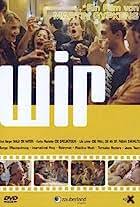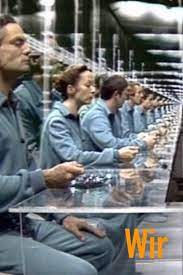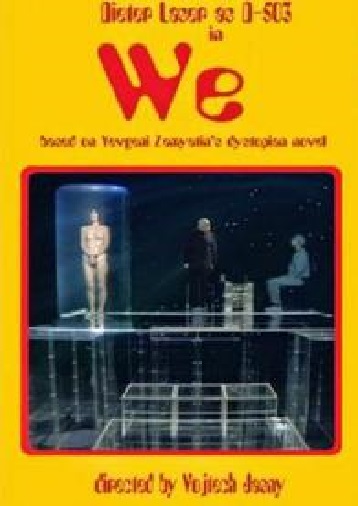Wir (1982) We
IMDb meta- data is a runtime of 1 hour and 38 minutes, rated 6.1 by 118 cinematizens.
Genre: Sy Fy; Species Dystopia.
DNA: West Germany.
Verdict: Blah.
Tagline: Replicated in Florida!

Fraternity Brothers Advisory: repeated nudity.
The united state of quadratic harmony and blue-grey conformity is über alles. Freedom has been eliminated in favour of one, oneness, sameness in the drab world where the number of chews of gruel is regulated.
The population lives and works in transparent glass cubicles to warm the heart of Jeremy Bentham’s progeny in McKinsey managers. Privacy breeds freedom and freedom undermines order, ergo there shall be no privacy. Wait, it’s starting to sound like Florida where the state regulates the activities in bedrooms and bathrooms, libraries and bookstores, and everything else (except guns) in the name of small government.
There are dissidents even in this crushing world, and a secret passage through a wardrobe (cf C S Lewis) that gets through the Green Wall that separates this Oneness from untamed nature including that Édouard Manet painting, Déjeuner sur l’herbe (1863).
The story centres on D-503 who starts as a happy citizen, joyfully denouncing his freedom, happily slaving on a major project to release others from dreadful freedom, who begins to have, well not second, but the first thoughts of his own. This ignition is kindled by sexual love pace Julia in Nineteen Eighty-Four. But he readily and happily submits to a lobotomy to have his pesky conscience removed while condemning his paramour to torture and death with a Gestapo smile.

In this 1982 television production there are some nice touches as when D-503 dictates to a Siri selectric typewriter (remember those?) that types out the text.
The screenplay is talkie and the direction is theatrical and expository rather than dramatic. It is a long time since I (re-)read Yevgeny Zamyatin’s novel We (1921) so I cannot say how closely it resembles this source material. By the way, its shelf-mate has to be Ayn Rand’s Anthem (1938).
I usually ignore dystopian films because they are so simple-minded and repetitive that they show little or no imagination, even less than the typical SyFy film. ‘The world went to hell because of … [name the villains].’ Zamyatin is an exception because of the time and place of his novel and his own personal backstory. There is a French short film based on Zamyatin’s novel that I will try to track down – Glass Fortress 2016 France 29 minutes.
The glass cells in which everyone lives and works reminded me of the new social science building. The rallies and oaths spouted must have echoed much of Nazism for German viewers in 1982. They certainly did for me.

